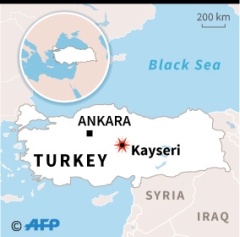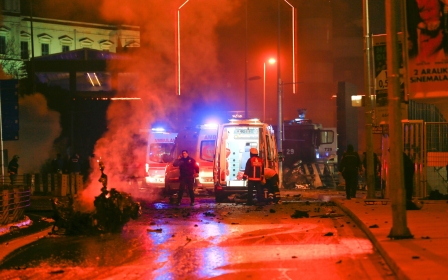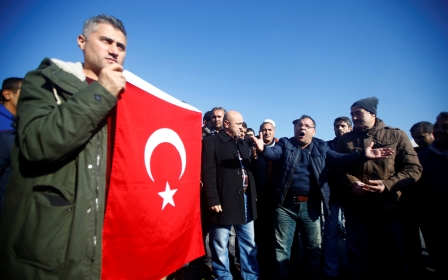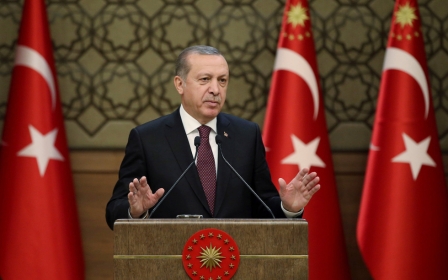Suicide car bombing kills 14 off-duty Turkish soldiers
Fourteen Turkish soldiers were killed and dozens more wounded on Saturday in a suicide car bombing blamed on Kurdish militants targeting off-duty conscripts, the latest in a string of attacks to rock Turkey in recent months.
The government said all signs so far suggested the outlawed Kurdistan Workers' Party (PKK) was behind the bombing in the city of Kayseri, a usually calm industrial hub in the heart of Anatolia.
Interior Minister Suleyman Soylu said 56 people were wounded, half a dozen of them seriously. The death toll has risen to 14 from 13 after one more soldier died in hospital, the official Anadolu news agency said.
That attack, which targeted a police bus, was claimed by the Kurdistan Freedom Falcons (TAK), seen as a radical offshoot of the PKK. No claim has come so far for the Kayseri bombing.
Television pictures showed the bus reduced to a smouldering wreck by the blast, which came a week after 44 people were killed in a double bombing in Istanbul after a football match hosted by the top side Besiktas.
"All indications at present point to the PKK," Deputy Prime Minister and government spokesman Numan Kurtulmus told NTV television.
He said that the materials used in the bombing were similar to those used in the Istanbul attack last week.
"You don't just buy these at the shopping mall... there is a logistical support," he said.
Prime Minister Binali Yildirim said that the attack was carried out by a "suicide bomber," without giving further details.
Fifteen suspects have already been detained over alleged involvement in the plot, Kayseri state prosecutor Mustafa Arslanturk was cited as saying by Anadolu.
The bus, carrying privates and non-commissioned officers, was attacked after leaving the commando headquarters in the city to take the off-duty soldiers on a shopping trip.
Those killed were in their early 20s, reports said. Turkish television broadcast harrowing footage of relatives bidding farewell to the coffins at a military airport.
President Recep Tayyip Erdogan said that the "acts of terror" in Turkey were "aiming at all 79 million of our citizens together with our soldiers and police".
"We will fight decisively against these terror organisations in the spirit of a national mobilisation," he said.
Turkey has seen a spate of deadly bombings in a bloody 2016 blamed both on Islamic State (IS) and Kurdish militants that have left dozens dead and put the country on daily alert.
In June, 47 people were killed in a triple suicide bombing and gun attack at Istanbul's Ataturk airport, with authorities blaming IS.
Another 57 people were killed in August in a suicide attack by an IS-linked bomber at a Kurdish wedding in the southeastern city of Gaziantep.
Kurdish militants have twice struck with bombings that killed dozens in Ankara in February and March.
The attacks have come with the civil war still raging in neighbouring Syria, where Turkey is staging its own incursion to expel militants and Kurdish militia from the border area.
Turkey is also still reeling from a failed 15 July coup blamed on the US-based Islamic preacher Fethullah Gulen that has been followed by a relentless purge of his alleged supporters from all state institutions.
One of the main cities of central Turkey, Kayseri is a key industrial hub with a population of over one million and is a stronghold of Turkish nationalists.
The city lies close to the famous landscapes of Cappadocia, a magnet for tourists from around the world, and well west of the main fighting between the PKK and security forces in the southeast.
After the bombing, dozens of protesters stormed the offices of the pro-Kurdish Peoples' Democratic Party (HDP) in Kayseri, draping a Turkish nationalist flag from the top floor, footage posted on social media showed.
The HDP condemned the attack on the soldiers "in the strongest possible terms" but said the country has "long passed the stage of settling with messages of condemnation".
EU foreign policy chief Federica Mogherini in a phone call to Turkish Foreign Minister Mevlut Cavusoglu said the bloc was committed to working with Ankara against terror but emphasised "full respect of the rule of law" must be guaranteed, her office said.
New MEE newsletter: Jerusalem Dispatch
Sign up to get the latest insights and analysis on Israel-Palestine, alongside Turkey Unpacked and other MEE newsletters
Middle East Eye delivers independent and unrivalled coverage and analysis of the Middle East, North Africa and beyond. To learn more about republishing this content and the associated fees, please fill out this form. More about MEE can be found here.





